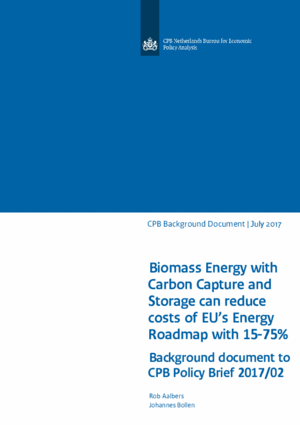Biomass Energy with Carbon Capture and Storage can reduce EU’s Energy Roadmap costs with 15-75%
The shift from using biomass through BECCS is economically attractive as its negative emissions enable more CO2 to be emitted without simultaneously jeopardising the overall emission reduction targets. As a result, relatively expensive CO2-reducing measures, such as electric driving and energy-neutral housing, would be (almost) completely unnecessary. To benefit from these lower climate-related costs, the ETS needs a reform that allows operators of BECCS to be rewarded for their negative emissions. However, even if this flaw of the ETS would be corrected, companies would be little encouraged to invest in BECCS, because the current price of emission allowances is too low. The incentive to invest in BECCS and reduce climate-related costs by 0.3 to 7.7 trillion euros will only be large enough if companies would be allowed to sell their emission allowances also to operators not falling under the ETS, or if the number of allowances within the ETS would be drastically reduced.
The use of BECCS in the EU will reduce rather than increase the global demand for biomass. The reason is that the demand for biomass in BECCS makes energy less scarce, because it increases the carbon budget. On the one hand, the demand for biomass increases because of BECCS. But on the other hand, the increase of the carbon budget allows for more fossil energy use, which in turn lowers the demand for renewable energy, and thus also for biomass. The net impact is a decline in the demand for biomass. Hence, there are no extra land-use requirements producing this biomass, or impacts on deforestation or food production. As to increase public support, the CO2 storage could be limited to offshore locations.
Downloads
Authors

